Artificial intelligence is transforming how startups operate, unlocking game-changing capabilities. Implementing the right AI tools at your early-stage company can help boost efficiency, analytics, customer engagement, and more to drive growth.
But with so many options now available, identifying the most high-impact AI solutions for your startup can be challenging.
This essential guide will overview the top 17 AI tools spanning categories like business intelligence, data science, design, and productivity that are must-haves for startups in 2025. Implementing even a few of these AI technologies at your company can have an outsized impact, providing transformative capabilities on a budget.
What are AI tools for startups?
AI tools for startups are specialized software and applications infused with artificial intelligence capabilities to aid new businesses in various aspects of their operations. These tools harness the power of AI to streamline processes, enhance decision-making, and drive innovation. They encompass a wide range of functions, including:
1. Customer Insights: AI tools analyze customer data to provide valuable insights, enabling personalized marketing strategies.
2. Chatbots: AI-powered chatbots automate customer support, offering 24/7 assistance and improving the user experience.
3. Predictive Analytics: These tools forecast trends and customer behavior, aiding in strategic planning and inventory management.
4. Automation: AI automates repetitive tasks, reducing operational costs and increasing efficiency.
5. Data Security: AI tools enhance cybersecurity by identifying and mitigating threats.
6. Natural Language Processing (NLP): NLP-driven tools enable language understanding and sentiment analysis for improved communication and content creation.
Startups can harness these tools to gain a competitive edge, make data-driven decisions, and scale their businesses more efficiently in today's technology-driven landscape.
What to Look for in AI Tools for Startup?
When selecting AI tools for startups, it's essential to consider various factors to ensure that the chosen tools align with your business needs and objectives.
Here are key aspects to look for:
1. Relevance to Your Industry:
Choose AI tools that are tailored to your specific industry, such as free AI tools for startups, AI-powered tools for startups, or AI solutions for startups. Some tools may offer industry-specific features and data models that can provide more meaningful insights and results. An AI tool designed for e-commerce may not be the best fit for a healthcare startup.
2. Ease of Integration:
Ensure the tool can seamlessly integrate with your existing systems and workflows, whether you're implementing free AI tools for startups or investing in more advanced AI solutions for startups. Compatibility and ease of implementation are critical to avoiding disruptions. The tool should have well-documented APIs and integration guidelines.
3. Scalability:
Look for tools that can grow with your startup, whether you're starting with basic artificial intelligence for startups or more sophisticated machine learning solutions. Scalability allows you to adapt to increasing demands as your business expands. Ensure that the tool can handle larger datasets and increased user loads without a drop in performance.
4. User-Friendliness:
User interface and ease of use are vital, especially when implementing free AI tools for startups, which often come with limited budgets. Your team should be able to operate the tool efficiently without extensive training. An intuitive and user-friendly interface is crucial for startups with limited resources.
5. Customization:
The ability to customize AI tools to match your unique business needs can be a significant advantage, whether you're working with free AI tools for startups or more advanced AI solutions. This allows you to tailor the tool to your specific requirements, such as creating custom algorithms or integrating with proprietary software.
6. Data Privacy and Security:
Ensure the tool complies with data protection regulations and provides robust security measures to safeguard sensitive information, whether you're using free AI tools for startups or advanced AI solutions. The tool should offer encryption, access control, and regular security updates.
7. Accuracy and Performance:
Evaluate the tool's performance in terms of accuracy and speed, whether you're leveraging basic artificial intelligence for startups or more advanced machine learning solutions. High precision and quick processing can significantly impact your results. Look for benchmarking data and performance metrics to assess this.
8. Cost and ROI:
Consider the cost of the tool and the potential return on investment, whether you're exploring free AI tools for startups or investing in more advanced AI solutions. It's essential to weigh the benefits against the expenses, including subscription fees, hardware requirements, and ongoing operational costs.
9. Support and Maintenance:
Assess the availability of customer support and regular updates, whether you're using free AI tools for startups or more advanced AI solutions. Reliable support is crucial for resolving issues and staying up-to-date with evolving technology. 24/7 support and a well-documented knowledge base are valuable assets.
10. Interoperability:
Check whether the tool can work alongside other AI tools or software solutions you plan to use, whether you're incorporating basic artificial intelligence for startups or advanced machine learning. Interoperability ensures a seamless technology stack, reducing integration challenges and compatibility issues.
11. Data Handling and Analysis:
Look for AI tools that excel in data handling, processing, and analysis, whether you're starting with free AI tools for startups or more advanced AI solutions. Features like data cleaning, transformation, and real-time analytics can be invaluable.
12. Training and Learning Capabilities:
If the AI tool involves machine learning, explore its training and learning capabilities, whether you're starting with free AI tools for startups or more advanced solutions. It should adapt and improve over time, requiring minimal manual intervention. Features like automated model retraining and fine-tuning are advantageous.
13. Feedback and Reviews:
Research user reviews and feedback from other startups using the same tool, whether they're utilizing free AI tools or more advanced AI solutions. Real-world experiences can provide valuable insights into the tool's strengths and weaknesses. Community forums and case studies are also valuable resources.
14. Trial Period:
Opt for tools that offer a trial period, whether you're considering free AI tools for startups or more advanced solutions. This allows you to assess whether the tool aligns with your startup's requirements before committing. A trial period helps you evaluate the tool's performance and whether it fits your business operations.
15. Future Development Roadmap:
Understand the tool's future development plans, whether you're considering free AI tools for startups or more advanced AI solutions. It should stay updated with the latest AI advancements and adapt to changing market dynamics. Transparency about the tool's development roadmap and commitment to staying current with industry trends is crucial for long-term success.
Best Must-Have AI Tool for Startups in 2025
1. ChatGPT:
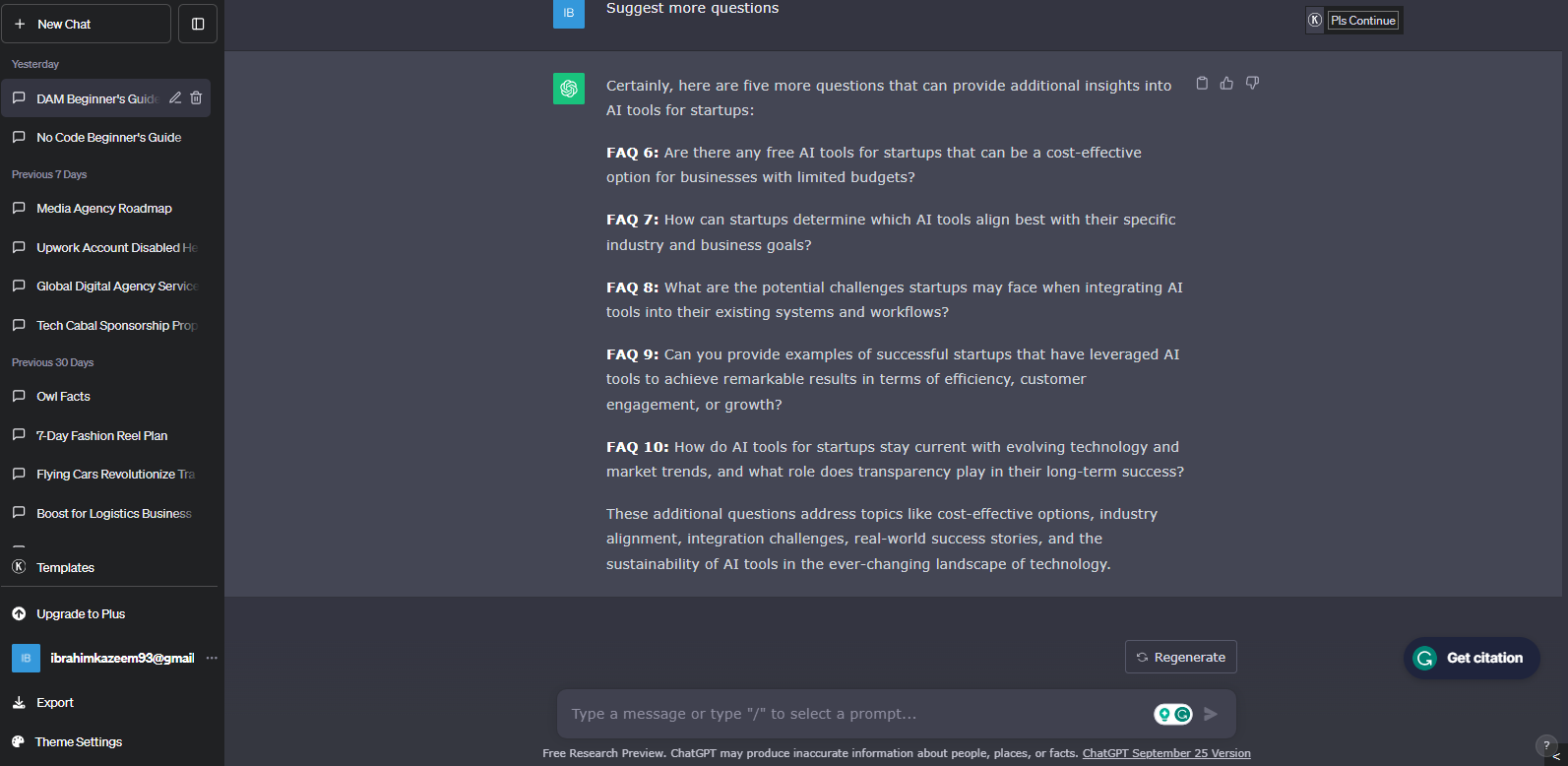
ChatGPT is an AI-powered chatbot and language model by OpenAI. It's one of the best AI tools for startups seeking to enhance customer support and engagement. It uses natural language processing and machine learning to provide real-time responses and can be integrated into websites and applications.
With a user-friendly interface, ChatGPT makes it easy for small businesses and entrepreneurs to offer instant support without extensive coding or AI expertise.
Whether you're looking for free AI tools for startups or more advanced solutions, ChatGPT provides an easy-to-use option that can help streamline communication with customers.
Features of ChatGPT:
· Natural Language Processing: Understands and responds to user queries with human-like language.
· Customization: Can be tailored to your specific industry and use cases.
· Real-Time Support: Provides instant responses to customer inquiries.
· Multilingual Support: Supports various languages for a global audience.
· Scalability: Adaptable to growing business needs.
Cons of ChatGPT:
· Dependency on Internet: Requires an internet connection for real-time operation.
· Limited Context: May not always understand complex or context-heavy queries.
2. Canva AI:
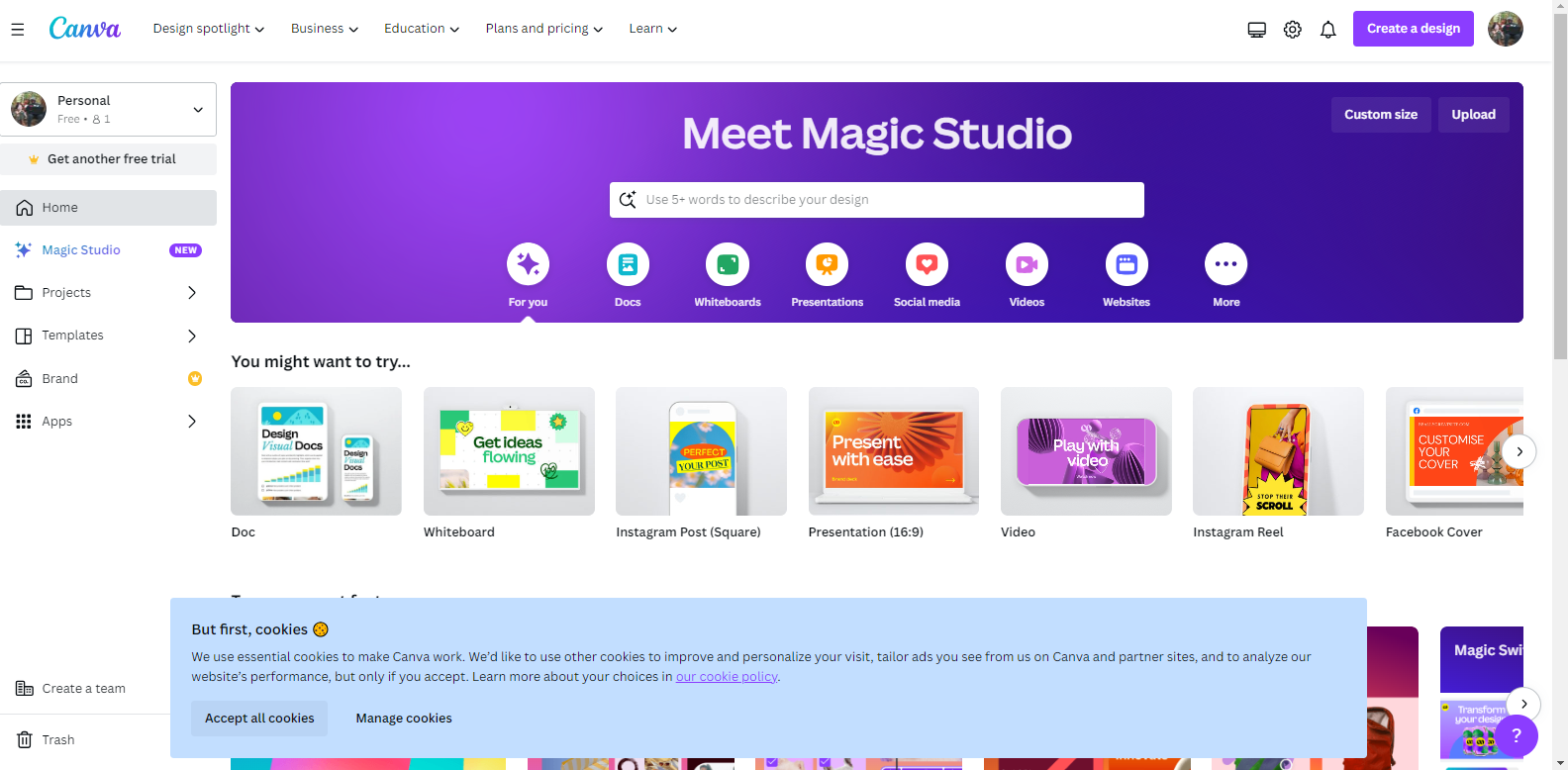
Canva AI is an AI-powered design tool that simplifies the graphic design process. It's particularly useful for startups looking to create eye-catching marketing materials.
With features like automatic image cropping and text layout suggestions, it's an excellent choice for entrepreneurs who may need more design expertise.
Whether you need social media graphics or promotional materials, Canva AI can save time and create professional-looking visuals with ease.
Features of Canva:
· Design Templates: Offers a wide range of customizable design templates.
· Image Enhancement: Automatically adjusts image quality for optimal visuals.
· Text Layout Suggestions: Assist in creating aesthetically pleasing text and graphic combinations.
· Collaboration Tools: Allows team members to collaborate on design projects.
· User-Friendly Interface: Easy to use, even for those with limited design skills.
Cons of Canva:
· Limited Customization: Some design elements may not be fully customizable.
· Free Features: While a free version is available, premium features come at a cost.
3. Bing AI:
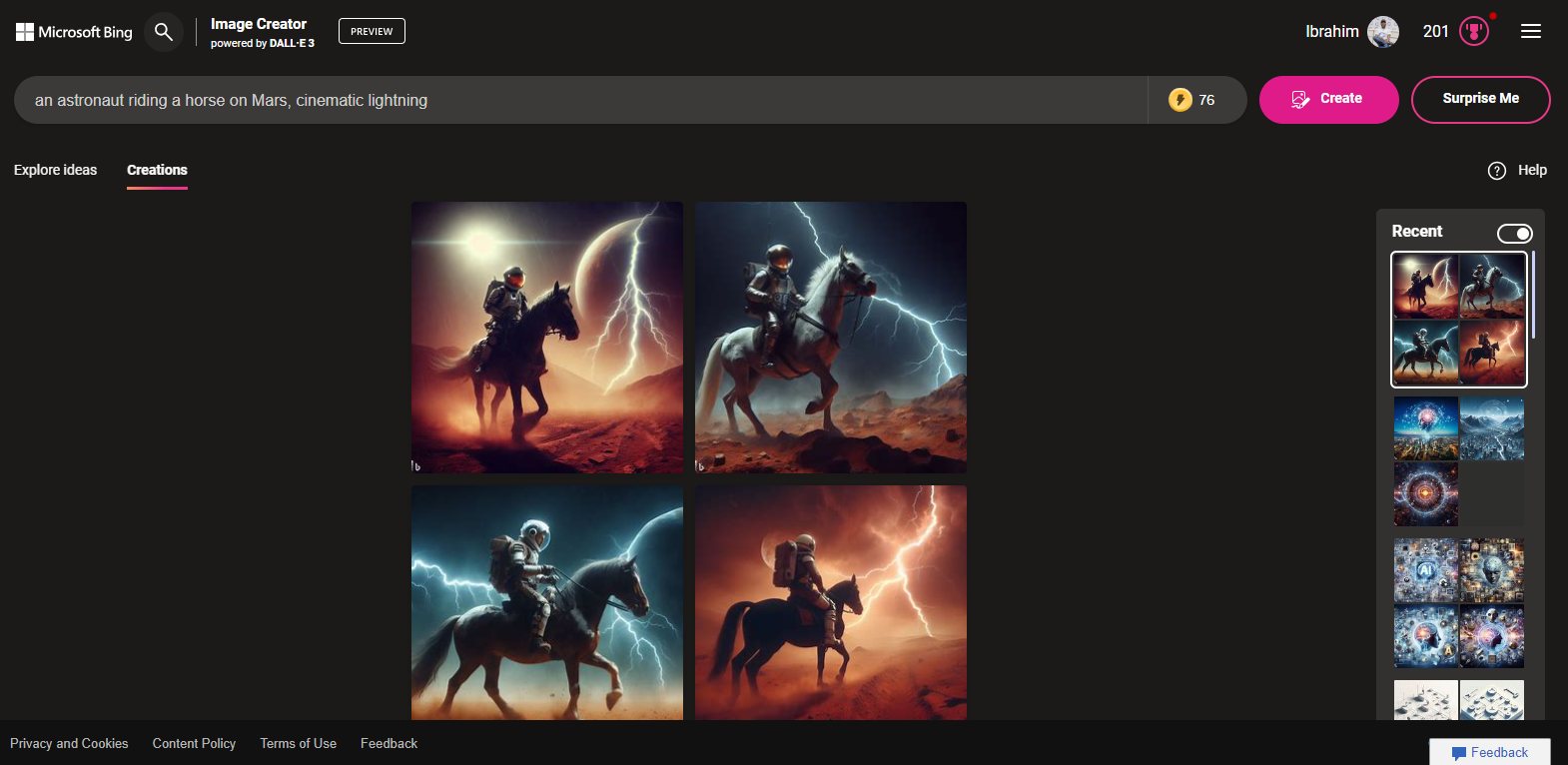
Bing AI, developed by Microsoft, offers a range of AI solutions for startups. It includes powerful search and language processing capabilities, making it a valuable tool for startups seeking to harness AI for information retrieval and analysis.
Whether you're looking to optimize your website's search functionality or perform sentiment analysis on customer feedback, Bing AI's suite of tools can provide valuable insights.
Features of Bing AI:
· Search Capabilities: Offers powerful search functionality for information retrieval.
· Language Processing: Provides natural language understanding and sentiment analysis.
· Data Insights: Offers data-driven insights through AI-powered analytics.
· Multifunctional: Suitable for a wide range of applications and industries.
· Data Security: Ensures data privacy and security compliance.
Cons of Bing AI:
· Limited Customization: May not be as customizable as some specialized tools.
· Integration Challenges: Integration into existing systems may require technical expertise.
4. Otter.ai:
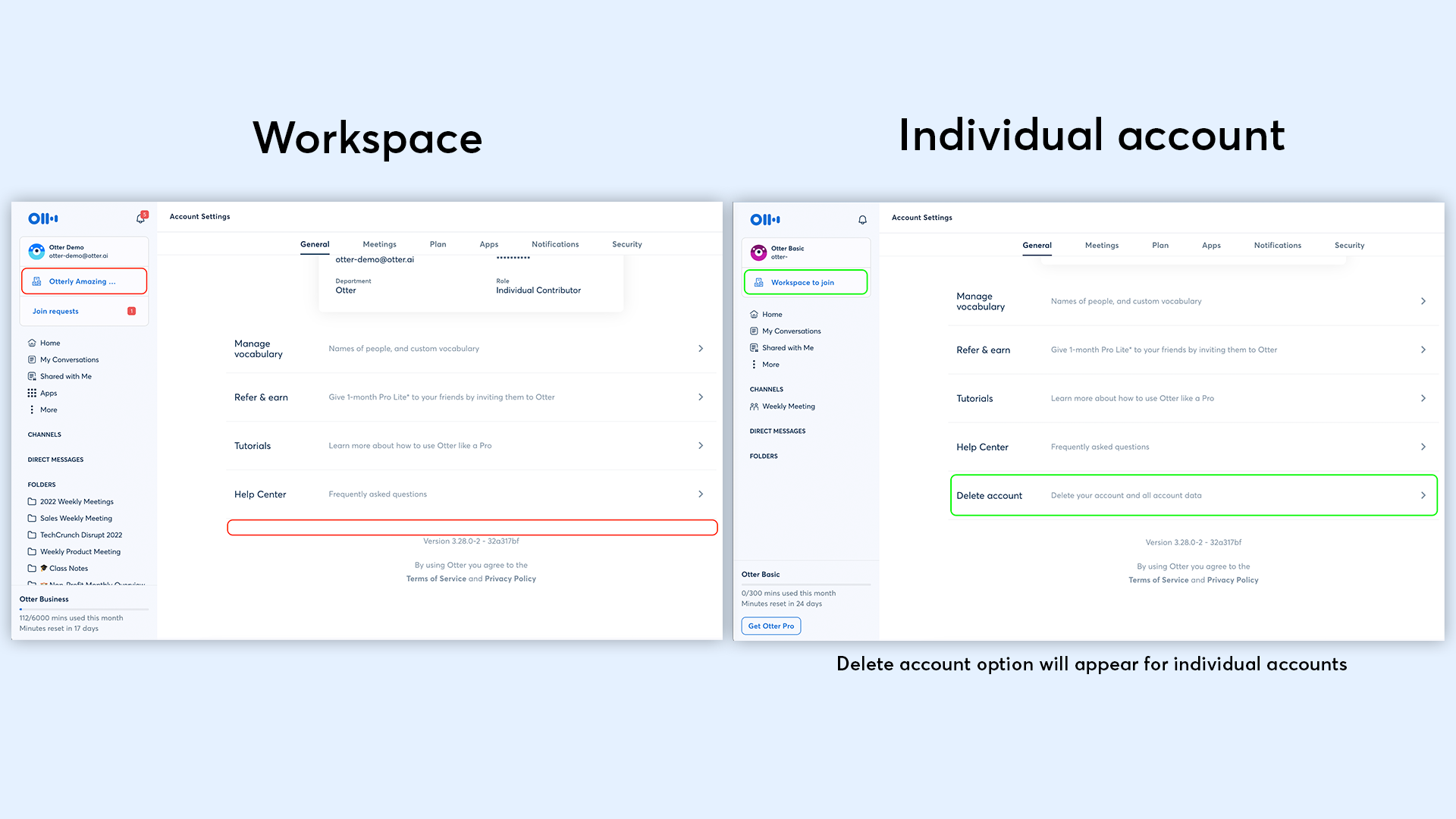 Otter.ai is a text
summarization and content generation tool that's beneficial for startups,
especially content-driven businesses. It uses AI to automatically create
summaries, generate articles, and assist in content curation.
Otter.ai is a text
summarization and content generation tool that's beneficial for startups,
especially content-driven businesses. It uses AI to automatically create
summaries, generate articles, and assist in content curation.
Whether you're a content marketer or a news aggregator, Otter.ai can help save time and resources, making it an excellent choice among AI tools for startups.
Features of Otter.ai:
· Text Summarization: Automatically generates concise summaries from lengthy texts.
· Content Generation: Creates articles and content based on user-defined topics.
· Content Curation: Assists in curating relevant content from the web.
· Multilingual Support: Supports content creation and summarization in various languages.
· Time-Saving: Reduces the time and effort required for content creation and summarization.
Cons of Otter.ai:
· Context Understanding: May not always capture the nuances of specific industries or topics.
· Subject Specificity: The tool's content generation may lack industry-specific knowledge.
5. Zapier:
Zapier is an automation platform that connects various web applications. It's an indispensable tool for startups aiming to streamline workflows and boost productivity.
By creating "Zaps," which are automated workflows, you can connect your favorite apps and automate repetitive tasks. Zapier is a user-friendly SaaS AI tool for startups, ensuring that you don't need extensive coding skills to set up powerful automations, making it ideal for small businesses and entrepreneurs.
Features of Zapier:
· Automation: Enables the automation of tasks across various web applications.
· Extensive Integration: Connects over 2,000 apps, allowing for versatile automation.
· Workflow Creation: This lets users build custom workflows without coding.
· Multi-Step Zaps: Supports complex automations with multiple steps.
· Triggers and Actions: Sets triggers and actions for different apps and data exchanges.
Cons of Zapier:
· Pricing Tiers: Some advanced features may require a premium subscription.
· Learning Curve: Learning how to set up complex workflows can be challenging for beginners.
6. Synthesia:
Synthesia is an AI video generation platform, providing startups with an efficient way to create video content.
With AI-powered video synthesis, you can generate personalized videos, tutorials, and marketing materials. It's a valuable asset for entrepreneurs and small businesses, offering a time-saving solution for video production.
Whether you're looking for free AI tools for startups or more advanced options, Synthesia can transform your ideas into engaging visual content.
Features of Synthesia:
· Video Generation: Automatically generates video content from text inputs.
· Personalization: Creates personalized video messages for diverse use cases.
· Multilingual Support: Offers video synthesis in multiple languages.
· Realistic Avatars: Uses AI-generated avatars that mimic human expressions.
· Visual Storytelling: Enhances content creation with engaging video materials.
Cons of Synthesia:
· Limited Free Usage: Extensive usage may incur costs, limiting free access.
· Customization Constraints: While customizable, it may not accommodate highly specialized video needs.
7. Grammarly GO:
Grammarly GO is an AI-driven writing assistant that helps startups enhance their written content. Whether you're crafting marketing copy, emails, or website content, Grammarly GO offers real-time grammar and style suggestions.
It's a valuable tool for entrepreneurs and small businesses looking to maintain professional and error-free communication. Grammarly GO can be used as a browser extension or integrated with various writing platforms, offering an easy-to-use solution for startups that value high-quality content.
Features of Grammarly GO:
· Grammar and Spelling Check: Provides real-time suggestions for grammar and spelling errors.
· Style and Clarity Enhancement: Offers suggestions to improve writing style and clarity.
· Plagiarism Detection: Checks content for potential plagiarism.
· Browser Integration: Easily integrates with browsers for error checking in various platforms.
· Multilingual Support: Supports multiple languages for global users.
Cons of Grammarly GO:
· Limited Free Features: Advanced writing enhancements require a premium subscription.
· Contextual Understanding: May not always grasp the context of highly specialized or technical content.
8. DALL-E 3:
DALL-E 3 is an AI-powered image generation model developed by OpenAI. It's a cutting-edge solution for startups seeking to create unique and visually striking content.
DALL-E 3 generates images from text descriptions, making it an invaluable tool for graphic design and visual storytelling.
Whether you're an entrepreneur looking to develop compelling visuals or a small business in need of creative marketing materials, DALL-E 3 is a game-changing addition to your toolkit.
Features of DALL-E 3:
· Image Generation: Creates images based on textual descriptions.
· Visual Artistry: Generates artistic and unique visuals from text inputs.
· Versatile Usage: Suitable for graphic design, marketing, and content creation.
· Customizable Style: Allows users to specify visual styles for generated images.
· Multimodal Capabilities: Combines textual and visual elements for creative output.
Cons of DALL-E 3:
· Complex Licensing: Commercial usage may involve licensing negotiations and costs.
· Artistic Interpretation: The tool's image generation may not always perfectly match user descriptions.
9. Midjourney V5:
Midjourney V5 is an advanced AI image generation model that provides startups with an opportunity to create stunning visuals. It uses deep learning techniques to generate images from text inputs, making it a powerful tool for graphic design and content creation.
Whether you're an entrepreneur in need of eye-catching marketing materials or a small business looking to enhance your branding, Midjourney V5 offers a versatile and innovative solution that can set you apart from the competition.
Features of Midjourney V5:
· Advanced Image Generation: Utilizes deep learning techniques for image creation.
· Text-to-Image Synthesis: Transforms textual descriptions into high-quality visuals.
· Creative Flexibility: Offers the freedom to explore various visual concepts.
· Industry Applications: Suitable for graphic design, marketing, and branding.
· Scalable Performance: Adapts to different business needs and image requirements.
Cons of Midjourney V5:
· Licensing Costs: Commercial usage may involve licensing fees and considerations.
· Learning Curve: Mastering the tool's advanced features may require some technical knowledge.
10. Hootsuite:
Hootsuite is a social media management platform that incorporates AI-driven features. It's an ideal choice for startups looking to boost their social media presence.
Hootsuite's AI tools help with content scheduling, performance tracking, and even suggest optimal posting times. Entrepreneurs and small businesses can benefit from Hootsuite's insights, which aid in crafting effective social media strategies.
Hootsuite websiteFeatures of Hootsuite AI
· Social Media Management: Centralizes social media accounts for streamlined management.
· Content Scheduling: Allows users to schedule posts for optimal audience reach.
· Analytics and Reporting: Provides in-depth insights on social media performance.
· Team Collaboration: Facilitates teamwork on social media campaigns and posts.
· Content Curation: Suggests and curates relevant content for sharing.
Cons of Hootsuite:
· Learning Curve: Managing multiple social media platforms effectively may require time and expertise.
· Cost of Premium Features: Advanced features may involve additional costs beyond the free version.
11.DocuSign:
DocuSign, while not solely an AI tool, incorporates AI for document management and e-signatures. Startups can streamline contract and document workflows with AI-driven features, saving time and reducing manual errors. This tool benefits entrepreneurs and small businesses looking for efficient and legally compliant document management.
DocuSign Features
· Digital Signatures: Enables secure and legally binding digital signatures on documents.
· Workflow Automation: Automates document approval and signing processes.
· Cloud Storage Integration: Seamlessly integrates with popular cloud storage platforms.
· Template Creation: Offers tools to create reusable document templates.
· Mobile Accessibility: Allows document signing and access from mobile devices.
DocuSign Cons:
· Pricing: Advanced features and high usage may come with higher subscription costs.
· Legal Compliance: Document legality and compliance may vary by region and industry.
12. HubSpot:
HubSpot is a comprehensive inbound marketing and sales platform with AI features tailored for startups.
Whether you're looking for CRM, marketing automation, or customer service solutions, HubSpot provides easy-to-use AI tools for small businesses and entrepreneurs. These tools help manage leads, automate marketing campaigns, and improve customer interactions, all in one integrated platform.
HubSpot CRM Features:
· Customer Relationship Management: Manages and tracks customer interactions and relationships.
· Marketing Automation: Offers marketing automation tools for lead nurturing.
· Sales Pipeline Management: Tracks sales processes and opportunities.
· Reporting and Analytics: Provides insights into customer and sales data.
· Integration: Easily integrates with various marketing and sales tools.
HubSpot Cons:
· Limited Free Features: Advanced CRM features may require a paid subscription.
· Learning Curve: Maximizing the use of all features may require training and expertise.
13. Miro:
Miro is a collaborative online whiteboard platform enriched with AI features, ideal for startups aiming to enhance remote teamwork and visual collaboration.
Whether you're an entrepreneur or small business looking to brainstorm, plan projects, or conduct virtual workshops, Miro's AI-driven tools simplify ideation and visualization, fostering creativity and efficient collaboration.
Miro Features:
· Online Whiteboard: Collaborative platform for visualizing and brainstorming ideas.
· Customizable Templates: Offers a wide array of templates for different tasks.
· Real-time Collaboration: Supports real-time collaboration among team members.
· Integrations: Connects with various tools for streamlined workflows.
· Scalability: Suitable for both small teams and large organizations.
Miro Cons:
· Pricing: Premium features and larger teams may involve higher costs.
· Complexity: Advanced usage and intricate visualizations may require more experience.
14. Descript
Descript offers startups
AI-powered audio/video editing tools like automatic transcription, editing via
text, voice cloning, and text-to-speech narration. This simplifies editing
podcasts, videos, audiobooks, and other media for non-technical users on a
budget.
Decript Features:
· Secure Communications: Offers end-to-end encryption for text and video communication.
· Privacy Control: Puts users in control of their data and privacy.
· Multidevice Support: Allows seamless communication across various devices.
· Integration: Easily integrates with existing tools and systems.
· Secure File Sharing: Enables secure sharing of files and documents.
Decript Cons:
· Learning Curve: Transitioning to a secure communication platform may require adaptation.
· Limited User Base: Adoption may be constrained by the need for recipient consent for secure communication.
15. Diffbot
Diffbot uses computer vision, natural language processing, and machine learning to automatically extract and structure data from web pages.
Startups can use Diffbot's AI web scraping technology to gather info from datasheets, articles, directories, reviews, and more to conduct market research, analyze competitors, collect leads, or populate internal databases.
This saves startups valuable time finding and organizing unstructured web data.
Diffbot Features:
· Web Data Extraction: Extracts structured data from websites and web content.
· Data Enrichment: Adds context and structure to unstructured web data.
· API Integration: Integrates with existing software and systems through APIs.
· Real-time Data Delivery: Provides real-time data updates and delivery.
· Scalability: Accommodates both small-scale and large-scale data extraction needs.
Diffbot Cons:
· Cost: Subscription costs for extensive data extraction and features.
· Data Structure Variability: Handling inconsistent website structures may require customization.
16. DeepL
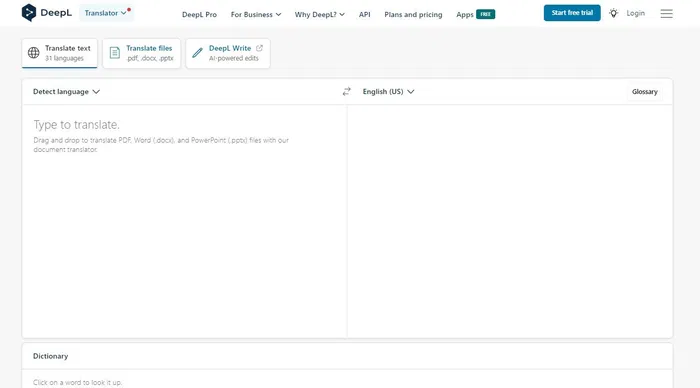
Overview of DeepL:
DeepL is an AI-powered translation tool that provides accurate translations with natural-sounding text. It’s widely used by students, businesses, and professionals for multilingual communication.
Features of Deepl:
- Highly accurate translations.
- Supports over 30 languages.
- Suggests context-based translations.
- Works offline with the desktop app.
- Includes document translation for Word and PDF.
Cons of DeepL:
- Limited features in the free version.
- Doesn’t support all languages.
- Large documents may take longer to process.
17. Notion AI
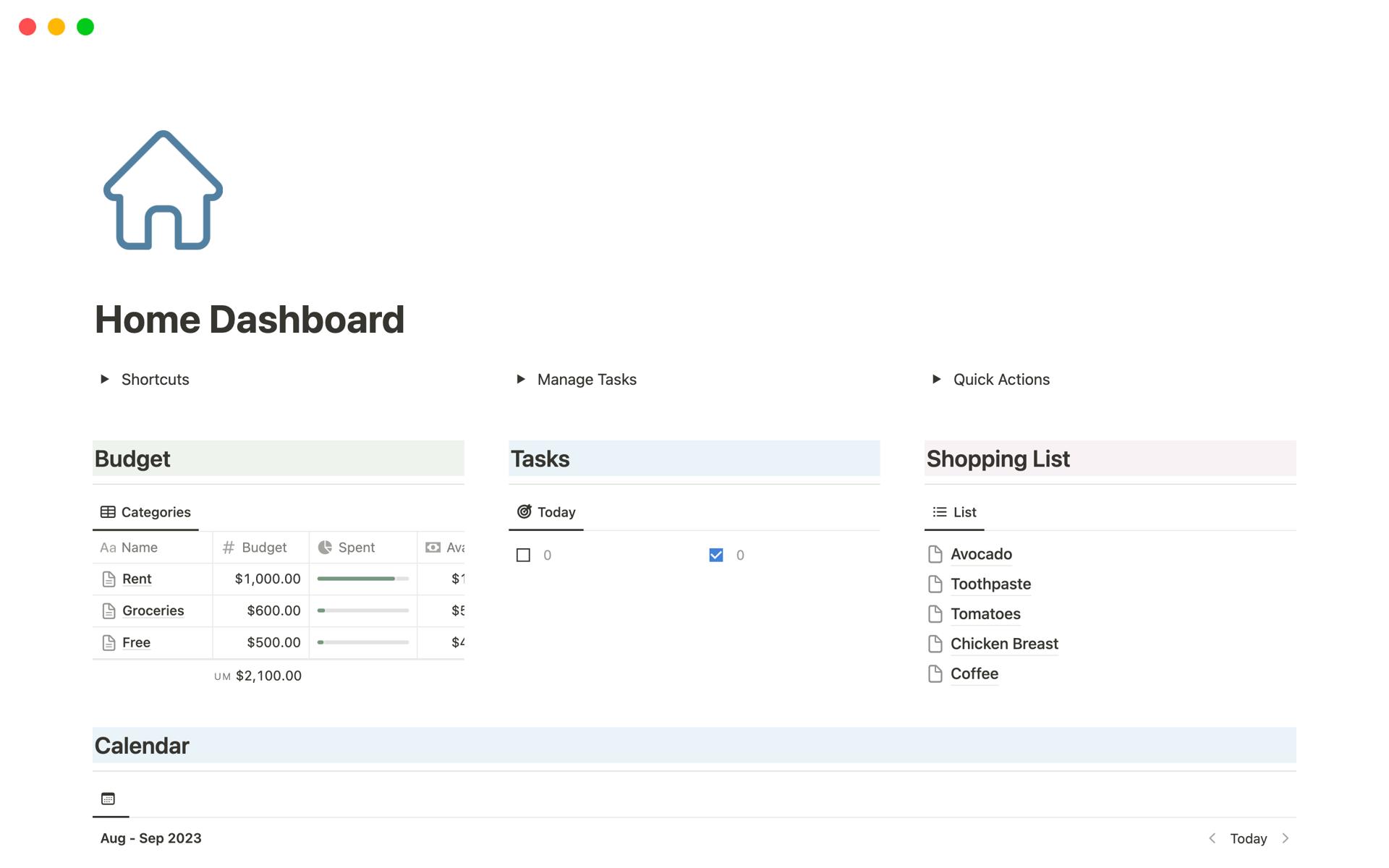
Overview:
Notion AI is a smart productivity tool that enhances note-taking, task management, and collaboration. It helps teams and individuals generate content, summarize notes, and streamline workflows. Its AI features save time by automating tedious tasks.
Features:
- Summarizes long documents quickly.
- Generates content ideas and outlines.
- Helps organize tasks and schedules.
- Integrates with other productivity tools.
- Works seamlessly for team collaboration.
Cons:
- AI features are limited without a premium subscription.
- Can feel overwhelming for new users.
- Occasional glitches with complex projects.
Conclusion: Best AI Tool for Startups in 2025
The artificial intelligence landscape is expanding rapidly, but only some emerging AI live up to the hype. This guide equips your startup with the most practical AI solutions available today to maximize impact and value.
Adopting the right technology at the right time gives startups an exponential edge over digital-first competitors. But success requires aligning AI capabilities with specific business challenges for targeted solutions.
With an informed AI strategy and the 17 recommended tools in this guide, any startup can implement transformative AI - no deep technical expertise needed. Give your startup the data-driven advantage to build, engage, and convert more efficiently.
FAQs on Best AI tools for startups
1. What are AI tools for startups?
AI tools for startups are specialized software and applications infused with artificial intelligence capabilities to aid new businesses in various aspects of their operations. These tools harness the power of AI to streamline processes, enhance decision-making, and drive innovation in areas like customer insights, chatbots, predictive analytics, automation, data security, and more.
2. What should startups look for in AI tools?
When selecting AI tools for startups, consider factors like relevance to your industry, ease of integration, scalability, user-friendliness, customization, data privacy and security, accuracy, cost, support, interoperability, data handling, training capabilities, feedback and reviews, trial periods, and future development plans to ensure they align with your business needs.
3. What are the best AI tools for startups in 2025?
In 2025, startups can benefit from a diverse set of AI tools. Some of the top options include ChatGPT for customer support, Canva AI for design, Bing AI for data insights, Otte.ai for content generation, Zapier for automation, Synthesia for video creation, Grammarly GO for writing assistance, DALL-E 3 for image generation, Midjourney V5 for advanced image creation, Hootsuite for social media management, DocuSign for document management, HubSpot CRM for customer relationship management, Miro for collaborative brainstorming, Decript for secure communication, and Diffbot for web data extraction.
4. What are the key features of these AI startup tools?
The highlighted AI startup tools offer features such as natural language processing, customization, real-time support, multilingual capabilities, scalability, image generation, text summarization, content curation, automation, collaboration, data analytics, data security, integrations, ease of use, accuracy, and more, depending on the specific tool's purpose.
5. What are the potential drawbacks of these AI tools for startups?
While these AI tools offer substantial benefits, potential drawbacks may include factors such as pricing, learning curves, limited customization, complexity, context understanding, licensing costs, and reliance on internet connectivity, depending on the tool and its use case.